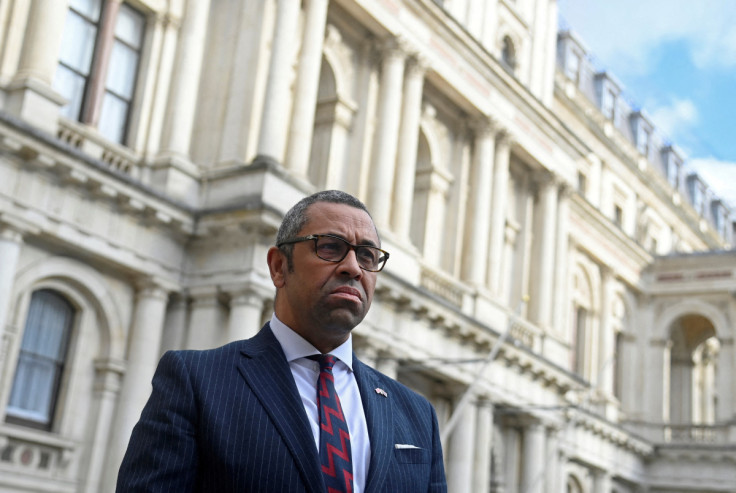UK Foreign Secretary's visit to China focuses on pragmatic engagement over isolation
Cleverly stressed the differences between the UK and China, cautioned against isolating the second-largest economy and underscored China's global complexity, pushing for practical ties.

During the momentous visit to Beijing, marking the UK foreign secretary's first foray into the Chinese capital in half a decade, James Cleverly has firmly emphasised the fallacy of attempting to isolate China.
The meetings convened on Wednesday saw Cleverly engage in substantive discussions with China's Vice President Han Zheng, and his itinerary also featured a scheduled tête-à-tête with the Foreign Minister Wang Yi.
Cleverly took the opportunity to convey to the assembled media that, while the United Kingdom remains acutely cognisant of its differences with Beijing, the imperative lies in nurturing a pragmatic rapport rather than perpetuating isolation of the world's second-largest economy.
In a nuanced observation, Cleverly underscored the intricate and multifaceted nature of China's global standing, characterising it as a nation of immense significance, profound influence, and complex dynamics. In this context, Cleverly highlighted the inevitable complexity of the UK's relationship with China, asserting that it must mirror the intricacies that define the Chinese nation itself.
He aptly remarked: "Our perception remains unclouded in discerning the areas where our stance diverges from that of China. We make it a point to address these disparities each time our paths intersect... However, it's imperative to recognise that a balanced, realistic working relationship with China is of paramount importance, given the intricate web of global issues that collectively concern us."
In his exchange with Han, Cleverly aptly underscored the importance of maintaining consistent face-to-face interactions between the governments to preempt any potential misunderstandings that might arise.
Furthermore, Cleverly emphasised the necessity of constructively engaging with and resolving the challenges and differences that invariably accompany bilateral relations.
Han, in response, expressed optimism that the bilateral relationship could be propelled to new heights through a commitment to mutual respect and practical collaboration. Notably, Cleverly's pre-visit statement posted on X, formerly recognised as Twitter, but inaccessible within China, succinctly captured the essence of engaging with China. He highlighted the significance of forthrightly expressing concerns during in-person dialogues.
Cleverly's sojourn to China was set into motion on Tuesday evening, with a pivotal meeting slated with his Chinese counterpart, Wang, scheduled for Wednesday. It's noteworthy that Cleverly's earlier July visit had been deferred due to the enigmatic vanishing and subsequent removal of China's erstwhile foreign minister, Qin Gang.
The discussions during this landmark visit are poised to encompass a range of concerns, notably Beijing's stance on Taiwan and its support for Russia. Notwithstanding China's portrayal of itself as a neutral mediator in the Taiwan conflict, it has refrained from casting any condemnation upon Russia's intrusion into Ukraine and has effectively offered support to Russia.
In recent days, reports have emerged of Vladimir Putin's impending visit to Beijing in October. This holds significance as it's one of the select few destinations the Russian president feels comfortable visiting, especially following an international criminal court warrant for his arrest.
Cleverly, in his prior statements, has consistently asserted that no international challenge can be effectively surmounted without integrating China into the discourse. However, he has simultaneously underscored the necessity of holding China accountable for its international commitments and obligations.
China's foreign ministry spokesperson, Wang Wenbin, lauded the upward trajectory of bilateral relations between the two countries, observing that Cleverly's visit is set to facilitate extensive discussions encompassing mutual interests and matters of international consequence.
Concurrently, Cleverly's visit to China has coincided with a momentous report emanating from the British foreign affairs select committee. This report has strongly advocated for adopting a zero-tolerance stance against Beijing's practices of "transnational repression".
While the report's authors have clarified that its timing is coincidental, its resonance is unmistakable as it aligns with Cleverly's overarching endeavour to rejuvenate political discourse and catalyse trade exchanges between the two nations.
The report, in its pointed analysis, has critiqued the government for manifesting a lack of coherence in its China-centric strategies. It further urges the release of an unclassified rendition of the China Strategy, thereby enhancing transparency. Importantly, the report advances the proposition that South Korea and Japan should be assimilated into the Aukus pact and the Quad – two informal multilateral alliances that China vehemently opposes, viewing them as being aligned against its interests.
Alicia Kearns, the esteemed chair of the Commons foreign affairs committee, has emphatically endorsed Cleverly's diplomatic initiatives. She has simultaneously extended a call to the prime minister, urging engagement with Xi Jinping whenever an appropriate opportunity presents itself. Kearns' advocacy has chiefly centred on the need to unequivocally convey opposition to transnational repression and authoritarian tendencies.
In a notable departure from previous diplomatic discourse, the committee's report explicitly refers to Taiwan as an independent nation. This stance, inherently at odds with China's stance, is a move likely to evoke Beijing's displeasure.
While Beijing steadfastly maintains that Taiwan is a province, the report posits that Taiwan does indeed possess the attributes of statehood, albeit with the notable exception of international recognition.
The British Parliament's assertive articulation of Taiwan's sovereignty carries symbolic weight, especially against the backdrop of Beijing's tightening grip on Hong Kong. The UK's resolute stance against the persecution of democracy advocates in the former colony and its concurrent expansion of asylum pathways for Hongkongers has elicited Beijing's ire, which perceives these actions as unwarranted interference.
While Cleverly aspires to unearth areas of collaboration, Tsang aptly highlights that China's actions are inherently guided by the directives of President Xi Jinping.
Tsang underscores that Cleverly's influence is fundamentally curtailed insofar as it concerns altering China's policies towards Russia or influencing its stance on international issues.
© Copyright IBTimes 2025. All rights reserved.






















